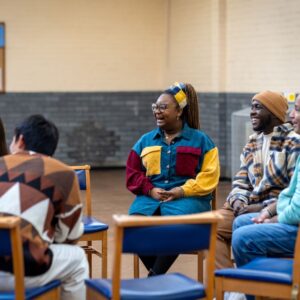6 Best Practices for Effective Leadership
Are effective leaders born that way, or are they cultivated over time? It may seem like some people are just naturally meant for leadership, but the truth is, effective leadership practices take time, humility, skill, and hard work to develop. It’s a never-ending process of growth and continuous learning.
And it’s not just about technical skill or business proficiency. Leading a group involves many of the same interpersonal skills we use in our everyday friendships and relationships.
As Patrick Lencioni says, “People will walk through fire for a leader that’s true and human.”
Sound like the kind of leader you’d like to be? In this blog, we’ll explore 6 best practices for leadership development and how you can implement them in your organization.
-
Authenticity
Good leadership practices come from the heart – that means showing up as your authentic self every day.
You may think that you have to put on a different persona to become a great leader, but people generally want to be led by someone “real”. The best approach is to be true to who you are – even when things are difficult.
The people you lead will respect you more if you’re honest about not only the victories you’ve won, but also the struggles you face or doubts you may have in your position. You’re human, after all! Your teams will appreciate your authenticity and relate to you more deeply.
On the other hand, nothing will erode the trust people place in you as a leader more than inauthenticity.
Inauthenticity can breed skepticism and strain the relationship you have with your team. Being authentically yourself is a sign of strong leadership and integrity, showing your team that you’re not afraid to be seen as human – something which will only strengthen your relationship with those around you.
2. A clear vision
Effective leaders know what they want to accomplish and a solid vision to guide their teams towards a common goal.
The clearer this vision is for you, the better you’ll be able to set objectives that align with the mission of your organization. With these in place, your teams will feel more confident in both your leadership and their ability to succeed.
A leader is supposed to lead, and the best way to do that is to look at the big picture of what you want your organization to achieve and lay out clear steps your teams will need to take to get there.
3. Creating a positive work culture
No matter how clear and ambitious your vision for your organization may be, a good leader can’t execute that vision without building respectful relationships with the people on their team.
As a leader, it’s vital that you create an encouraging work environment – a culture of mutual respect where everyone feels safe sharing their thoughts and opinions.
It’s about more than avoiding disrespectful behavior or harsh judgment. It’s about making a consistent, conscious effort to foster collaboration, actively listen, and show that you value others’ contributions.
As Kelly M. Hannum, author of Leading Across Differences, says, “You may not need to make huge changes in your behavior to be more effective. Just understanding and acknowledging as valid what others expect from you will make a difference.”
When people feel their perspectives matter, and that they’ll be truly heard and listened to, they’ll know they’re a valued member of the team. And it starts with you. When you lead by example and create a work culture where each employee feels valued and respected, you encourage that behavior among your team as well.
4. Adaptability
Among the most important aspects for leadership development are adaptability and resilience. You can’t count on the current status quo. Things change – these days, faster than ever – and you have to be ready for whatever comes next.
In times of doubt or change, the best leaders are flexible, prepared to pivot if necessary to handle any hurdle life places in the way. This kind of resilience can push your team forward when things get tough.
And change doesn’t always have to be scary! As an adaptable leader, you’ll be able to spot positive shifts in your industry and grab opportunities for growth as they arise.
When you lead with flexibility, ready to adapt to any change that comes your way – for better or worse – your team will follow suit, building a stronger organization as a result.
5. Trusting your team
Like in any relationship, trust is fundamental to great leadership practice. You can’t lead a team effectively if they don’t trust in you or your capabilities.
And it works both ways – your team can tell if you don’t have trust in their skills and abilities, and without that confidence, they’re less likely to feel like valued members of the organization.
People who work in companies with high trust report 74% less stress and 106% more energy at work. Employees who trust (and feel trusted by) their leaders are more committed, more satisfied, and less likely to leave.
Prioritizing transparency, treating your team fairly, and acting reliably, you can establish yourself as a trustworthy leader. And by putting your trust in those who look to you for leadership, you’ll make them feel more secure, boosting their confidence in their abilities to contribute to your organization in a meaningful way.
6. Clear communication
No exploration of leadership best practices would be complete without highlighting the importance of clear communication. Good leaders prioritize communication within their team and refine their approach as needed to keep everyone on the same page.
Misunderstandings lead to mistakes, and mistakes can not only lead to costly losses or reputational damage to your company, but they can erode trust and destroy confidence in your employees.
As a leader, you need to be able to communicate your vision, goals, and ideas clearly enough to give your team members the confidence they need to fulfill their roles effectively.
But successful communication is more than what you say and how you say it – your ability to listen is just as important.
Encouraging your team to speak up with their questions, concerns, ideas, or feedback – and following through on their input as needed – ensures your team members that their needs are being heard, and that they genuinely matter.
Plus, you’ll be able to lead more effectively with the insights they provide. Invite your team to give constructive feedback on a regular basis to help keep a two-way communication channel open in your organization.
Ready to become the leader you know you can be?
Our Transforming Communities Program gives individuals and teams the skills they need to strengthen their organizations and communities. Throughout the program, participants will:
- Gain greater clarity on their team and organization
- Build foundations for healthy teamwork
- Develop better ways to understand identity and belonging
- Learn new skills like design thinking, better listening, and community development
Take the next step toward strengthening your leadership and empowering your team for success with the Center for Transforming Engagement. Discover our range of options and workshops today.










0 Comments